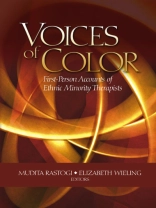Voices of Color: First Person Accounts of Ethnic Minority Therapists is the first book to address the training, academic, and professional experiences of ethnic minority therapists. Using real cases, narratives, and biographical material, each chapter motivates the reader to ponder and challenge how issues related to mental health intersect with race/ethnicity within a broader diversity framework.
The contributors represent various mental health disciplines, and they all write from a systemic perspective on therapy cases, theory, new models, and research. The authors present powerful narratives of how their personal and professional experiences inform each other. These insider perspectives are placed within a broader systemic context highlighting the interplay between personal, academic, and professional political relationships and their symbiotic impact on individuals, families, and communities.
These combined voices of color add a new and significant perspective to the awareness of students, clinicians, educators, supervisors, and administrators regarding their personal position vis-à-vis psychotherapy, different multicultural dimensions, and social justice.
Table of Content
Chapter 1: Introduction – Mudita Rastogi and Elizabeth Wieling
Section I: Identity and Professional Development of Therapists of Color
Chapter 2: Emerging Identity: An Asian Indian Female Psychologist′s Perspective – Monika Sharma
Chapter 3: Our Stories: Convergence of the Language, Professional, and Personal Identities of Three Latino Therapists – Luis Antonio Rivas, Edward A. Delgado-Romero, and Kelly Ramon Ozambela
Chapter 4: When Turtle Met Rabbit: Native Family Systems – Janet M. Derrick
Section II: Ethnicity and Race in the Therapy Room and in the Classroom
Chapter 5: African American Women in Client, Therapist, and Supervisory Relationships: The Parallel Processes of Race, Culture, and Family – Shalonda Kelly and Nancy Boyd-Franklin
Chapter 6: Taking Off the Mask: Breaking the Silence–The Art of Naming Racism in the Therapy Room – Larry Lee
Chapter 7: When Racism Is Reversed: Therapists of Color Speak About Their Experiences With Racism From Clients, Supervisees, and Supervisors – Saba Rasheed Ali, Jonathan R. Flojo, Krista M. Chronister, Diane Hayashino, Quincy R. Smiling, Danielle Torres, and Ellen Hawley Mc Whirter
Chapter 8: Toward a Liberation Pedagogy: Creating a Safe Environment for Diversity Conversations in the Classroom – Debra A. Nixon
Chapter 9: Post 9/11: Combating Racism in the Sanctity of Healing–A Clinical Vignette Utilizing a Cultural Process Dialogue – Azmaira H. Maker
Chapter 10: Stories From Urban and Rural Landscapes: The Development of a Cultural Identity – Laurie L. Charles
Chapter 11: The Process of Integrating Language, Context, and Meaning: The Voices of Bilingual and Bicultural Therapists – Carmen Aguirre, J. Maria Bermudez, J. Ruben Parra Cardona, Jorge Antonio Zamora, and Nenetzin Angelica Reyes
Chapter 12: International Academic Sojourners in the United States of America: Color in the Ivory Tower – Mudita Rastogi and Carole Woolford-Hunt
Section III: Theory- and Research-Based Interventions and Approaches
Chapter 13: South Asians in the United States: Developing a Systemic and Empirically Based Mental Health Assessment Model – Azmaira H. Maker, Mona Mittal, and Mudita Rastogi
Chapter 14: Black Women Victims and Perpetrators of Family Domestic Violence: A Therapeutic Model Incorporating Racism and Black History – Denise D. Mc Adory
Chapter 15: From Polarization to Pluralization: The Japanese Sense of Self and Bowen Theory – Narumi Taniguchi
Chapter 16: Kum Ba Yah: The Relevance of Family Systems Theory for Clinicians and Clients of African Descent – Martha Adams Sullivan
Chapter 17: Family Therapy From a Hindu Indian Worldview – Nithyakala Karuppaswamy and Rajeswari Natrajan
Chapter 18: Developing Culturally Appropriate, Evidence Based Treatments for Interventions With Ethnic Minority Populations – Melanie Domenech Rodriguez and Elizabeth Wieling
Chapter 19: Acculturation Versus Cultural Identity: The Need for New Cultural Lenses in the Mental Health Professions – J. Ruben Parra Cardona, Richard S. Wampler, and Dean M. Busby
Index
About the author
Elizabeth Wieling, Ph.D. Research interests involve the development of culturally sensitive and effective clinical interventions, cross-cultural therapy and supervision, inter-cultural couple relationships, and issues related to the status of women, including their mental health, family relationships, education, economic well-being, and political influence in the United States and abroad.
I am currently investigating the cultural adaptation processes involved in modifying an evidence based parenting treatment program to better fit the cultural characteristics of a sample of at-risk Latina single mothers and children. Specifically, I am analyzing the Parenting Through Change parenting intervention developed at the Oregon Social Learning Center for its cultural relevance using an Ecological Cultural Model. I am examining the dimensions and specific cultural processes to be modified and integrated into the culturally adapted intervention, which will be manualized for later implementation. Experimental groups comprised of the standard and culturally adapted parenting interventions will be implemented to further understand issues related to study effectiveness and efficacy with this population. This study is being conducted as part of a 5-year Career Development Award funded by the National Institute on Mental Health.












